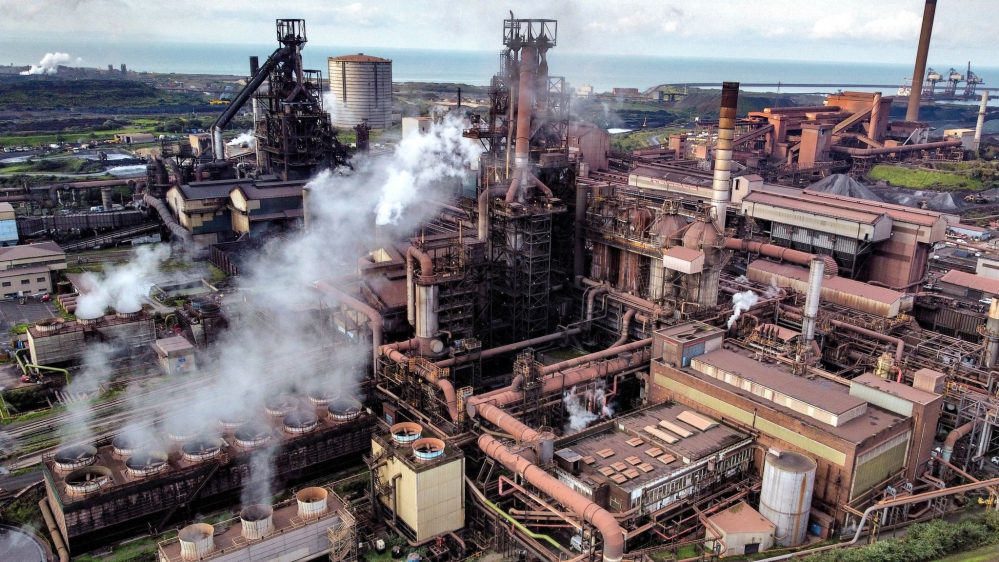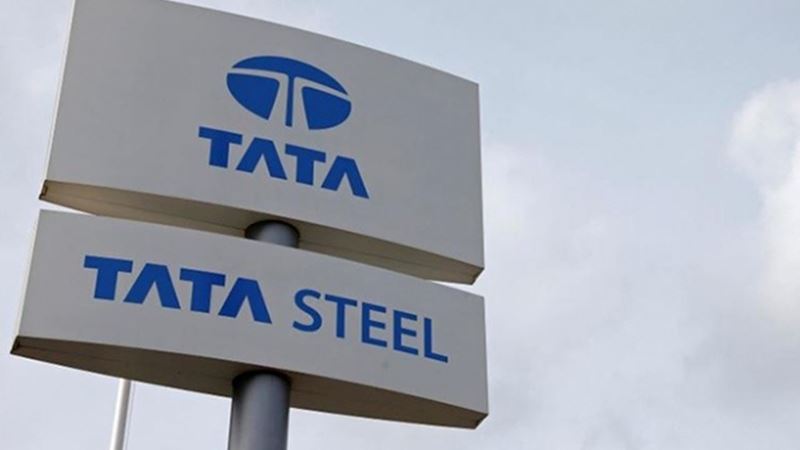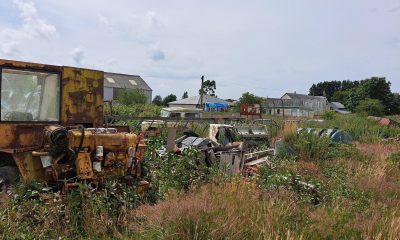Business
An experimental nuclear fusion reactor could be built in Pembrokeshire

PEMBROKESHIRE could be the location of an experimental nuclear fusion reactor, which could produce abundent clean energy, if the council backs plans for a site on land owned jointly between Valero oil refinery and Pembroke Power station.
Pembrokeshire County Council’s Cabinet will be asked next week (May 17) to support the project, which it is hoped could create limitless energy.
The officers of the council are recommending to Cabinet that members approve the nominated site being included on the list of UKAEA candidate sites.
Elsewhere in Wales, the Vale of Glamorgan Council is bidding for it to be built at the Aberthaw power station site.
Communities had until the end of March to nominate locations.
If approved the nuclear fusion station, the council’s officers say, could position Pembrokeshire at the international forefront of the clean energy revolution, bringing visibility to the community on a global stage. It was also recommended that the project will bring long-term and enduring environmental, employment, skills and economic benefits to the host community.
However, Greenpeace believes that nuclear fusion is an expensive distraction from the real agenda of providing environmentally benign, reliable energy supply. The campaign group gas also written to Parliament saying that the deuterium-tritium (D-T) fuel mixture used in nuclear fusion produces four times as many high energy neutrons per kilowatt-hour of energy produced than sandard nuclear fission.

Nevertheless the government has a concept programme called STEP, which is an ambitious programme for the conceptual design of a fusion power station. It is a UKAEA administered programme, currently with £220 million funding to produce a phase 1 concept design by 2024.
Beyond 2024, it is claimed, phase 2 intends to move into the engineering design and build phases to deliver the prototype of a commercially viable fusion plant. The prototype will hopefully demonstrate the commercial viability of fusion. The learning from this will enable the future development of a UK fleet of commercial fusion plants, the government said. The target date for the first fully operational plant will be 2040.
In November 2020, the UK Government released an open call to communities across the UK to identify sites that could accommodate a STEP power station, with the site near Valero being chosen.
A report to councillors sitting on the Cabinet states that unlike with conventional nuclear power, there is a benefit of limited risk of nuclear materials proliferation. This is because nuclear fusion doesn’t employ fissile materials like uranium and plutonium. There are no enriched materials in a fusion reactor that could be exploited to make nuclear weapons.
The STEP programme said that it seeks to maximise the recycling and re-use of materials and only use disposal routes where there is no other option.
It said to this end research is being carried out on suitable materials to minimise decay times as much as possible. Any radioactivity of the components in the tokamak structure is classed as low level and relatively short lived.
Fusion is regarded by Government as being carbon free, safe, low land use, low, manageable waste, reliable energy baseload with unlimited fuel.
Paul Miller, Cabinet Member for Economy, Tourism, Leisure and Culture on Pembrokeshire County Council said: “The Haven Waterway has provided livelihoods, underpinned by fossil fuels, for thousands of Pembrokeshire families, mine included, for more than 50 years.
“Its my job to help ensure the waterway continues to provide high skilled, engineering, science and technology jobs for the next generation of this county and so linked to our focus on climate change (and in addition to our existing multi-million pound commitments to supporting wind, wave and tidal clean power generation) my team have been exploring whether we can also support the development of clean, green fusion technology.
“It very early days in the UK Atomic Energy Authority’s site selection process but we’ll provide regular updates as things progress.”
What is nuclear fusion?
Fusion is the process that takes place in the heart of stars and provides the power that drives the universe. When light nuclei fuse to form a heavier nucleus, they release bursts of energy. This is the opposite of nuclear fission – the reaction that is used in nuclear power stations today – in which energy is released when a nucleus splits apart to form smaller nuclei.

To produce energy from fusion here on Earth, a combination of hydrogen gases – deuterium and tritium – are heated to very high temperatures (over 100 million degrees Celsius). The gas becomes a plasma and the nuclei combine to form a helium nucleus and a neutron, with a tiny fraction of the mass converted into ‘fusion’ energy. A plasma with millions of these reactions every second can provide a huge amount of energy from very small amounts of fuel.
One way to control the intensely hot plasma is to use powerful magnets. The most advanced device for this is the ‘tokamak’, a Russian word for a ring-shaped magnetic chamber. CCFE’s goal is to develop fusion reactors using the tokamak concept.
Advantages of fusion power
With increasing concerns over climate change and finite supplies of fossil fuels, we need new, better ways to meet our growing demand for energy. The benefits of fusion power make it an extremely attractive option:
- No carbon emissions. The only by-products of fusion reactions are small amounts of helium, an inert gas which can be safely released without harming the environment.
- Abundant fuels. Deuterium can be extracted from water and tritium will be produced inside the power station from lithium, an element abundant in the earth’s crust and seawater. Even with widespread adoption of fusion power stations, these fuel supplies would last for many thousands of years.
- Energy efficiency. One kilogram of fusion fuel could provide the same amount of energy as 10 million kilograms of fossil fuel. A 1 Gigawatt fusion power station will need less than one tonne of fuel during a year’s operation.
- Less radioactive waste than fission. There is no radioactive waste by-product from the fusion reaction. Only reactor components become radioactive; the level of activity depends on the structural materials used. Research is being carried out on suitable materials to minimise decay times as much as possible.
- Safety. A large-scale nuclear accident is not possible in a fusion reactor. The amounts of fuel used in fusion devices are very small (about the weight of a postage stamp at any one time). Furthermore, as the fusion process is difficult to start and keep going, there is no risk of a runaway reaction which could lead to a meltdown.
- Reliable power. Fusion power plants will be designed to produce a continuous supply of large amounts of electricity. Once established in the market, costs are predicted to be broadly similar to other energy sources.
Business
Cabinet Secretary for Economy says Tata chose to ignore multi-union report

TATA STEEL has confirmed to the Welsh Government plans to close its two blast furnaces at Port Talbot, transitioning to electric arc furnace steelmaking as part of a £1.25bn strategy. This move is set to impact approximately 2,800 jobs, with major implications for the local community and wider Welsh economy.
Jeremy Miles MS, Cabinet Secretary for Economy, Energy and Welsh Language, expressed deep disappointment over the company’s decision to disregard the multi-union report’s recommendations for a more sustainable transition. This report, commissioned by the UK Steel committee, had advocated for measures that would reduce the environmental impact of steel production while considering the workforce’s welfare.
The phased closure will begin with Blast Furnace 5 in June, followed by Blast Furnace 4 and other heavy assets by September’s end. Over the next 18 months, the first wave of job reductions will take effect, beginning this July, with further losses anticipated at the Llanwern site over the next two to three years.
The Welsh Government has criticised the pace of the transition, suggesting that a more extended consultation period between Tata and the unions might have mitigated the scale of job losses. As the company prepares for a three-year transition period, it will rely heavily on steel imports to meet customer demands, a move that raises concerns about the future of local production capacity.
Miles underscored the strategic importance of the Welsh steel sector, not only for the local economy but also as a vital component of the UK’s industrial landscape. He urged Tata Steel to avoid compulsory redundancies and to collaborate closely with the Transition Board to provide the necessary support, including reskilling and employment opportunities for the affected workers.
The confirmation of the shift has prompted significant unrest among the workforce, with unions balloting for potential industrial action. Tata has set conditions on its voluntary redundancy packages, which are subject to ongoing negotiations along with future investment commitments.
The Welsh Government remains committed to supporting the steel industry, emphasizing the need for a clear and substantial investment vision that will ensure the sector’s sustainability and the prosperity of its workforce. The transition board has already initiated various support mechanisms, including job fairs, advisory sessions, and a comprehensive action plan to cushion the economic impact on the community.
This transition marks a challenging new chapter for Port Talbot and the entire Welsh steel industry, with long-term implications for the regional economy and its people.
Commenting, Welsh Conservative Shadow Economy Minister, Samuel Kurtz MS said: “The disappointment felt by those losing employment at Tata cannot be understated. We need to support our steelworkers, not just with warm words, but with skills, retraining and jobs.
“We have been clear that we want to see a blast furnace remain open in the transition to electric arc furnaces and we need to take full advantage of the opportunities that the new Celtic Freeport will bring.”
In a joint statement following their respective contributions in response to the statement, local Senedd Members for South Wales West, Tom Giffard MS and Dr Altaf Hussain MS added: “We need to support our communities in and around Port Talbot more than ever following the disheartening news from Tata.
“It is a matter of deep regret that the Labour Welsh Government have yet to put a single penny on the table to support the UK Conservative Government-funded transition board. We need more detail from Labour as to what they are actually doing to back the workforce.”

Business
Women make better homeworkers than men, according to new survey

A GROUNDBREAKING survey conducted by the team behind the British Business Excellence Awards (www.britishbusinessexcellenceawards.co.uk) have uncovered a significant trend in the remote work landscape: women are leading the charge as successful remote workers, surpassing men in both productivity and overall satisfaction with remote work arrangements.
The survey, encompassing more than 2,300 UK adults in full-time employment (a 50/50 split of men and women), revealed a striking trend: over two thirds of employees (69%) perceive female remote workers as more productive than their male counterparts. Contrary to traditional assumptions, women are not only adapting to remote work, but thriving in it.
Additionally, over three-quarters of women (76%) reported increased productivity since transitioning to remote work, compared to 54% of men. This shift in productivity is closely tied to work-life balance, with 72% of women indicating an improved balance since working remotely, compared to 58% of men.
Female remote workers also stood out in terms of approachability and support, with a staggering three-quarters of respondents (75%) perceiving female colleagues as more approachable in the virtual workspace. This accessibility and support contribute to a more cohesive and connected remote work environment.
In a reflection of the evolving priorities in the business world, over half of men (54%) and three-fifths of women (61%) believe that female remote workers are more progressive when it comes to sustainability and environmental initiatives. Women in remote roles were perceived as having a stronger focus on implementing sustainable practices and promoting eco-consciousness in their virtual teams.
Conversely, the survey highlighted a perception that male remote workers are more comfortable with embracing technology and artificial intelligence (AI), with 78% of men and 61% of women expressing this view. This suggests that male remote workers are seen as driving digital transformation and leveraging tech tools more readily in the virtual workspace.
Sarah Austin, Director of the Lloyds Bank British Business Excellence Awards, commented:
“These findings challenge traditional norms and underline the importance of fostering an inclusive work environment where all employees, especially women, can thrive. The data clearly shows that women bring unique strengths to remote work, contributing to higher productivity, improved work-life balance, and a focus on sustainability.
“The survey underscores the significant advantages of supporting and promoting women in remote work settings. As businesses continue to navigate the remote work landscape, understanding and leveraging the strengths of female remote workers can lead to enhanced productivity, employee satisfaction, and overall success.”
Business
Improved customs infrastructure promised for Port of Fishguard

SIGNIFICANT developments are poised to transform the Port of Fishguard in Pembrokeshire as a result of Brexit, with proposed enhancements including expanded parking for heavy goods vehicles and the construction of new processing facilities.
The Welsh Government has announced the need to augment customs infrastructure at this key transit point following the UK’s departure from the European Union. This expansion will bolster the port’s capacity and introduce a suite of new structures: two processing buildings—one permanent and one temporary—a mechanical and electrical plant, a waste management building, two water tanks, and enlarged parking facilities for heavy goods vehicles.
In preparation for these enhancements, the government has issued a tender for initial groundwork. This encompasses geotechnical and geo-environmental studies for three proposed buildings dedicated to processing, produce, small animals, and livestock. Additional plans include nine supplementary structures such as mechanical and electrical plants, an animal waste facility, various plant structures, and three water tanks.
The scheme also includes the establishment of a new parking area designed to accommodate 50 trailers, improvements to coastal protection measures, slope reprofiling, and the construction of retaining walls as necessary to support the new parking layout.
This infrastructure upgrade is in line with Stena Line Ports Fishguard’s strategy to adapt to new UK-EU trade dynamics post-Brexit. As border controls tighten, particularly for animal and plant products from the EU, physical inspections are set to begin across Great Britain from April 30 this year. Notably, Stena’s route from Rosslare to Fishguard remains the sole ferry connection from the Republic of Ireland to Great Britain that transports livestock.
Although inspections of these imports from Ireland are not anticipated to commence before spring 2025, the establishment of Border Control Post (BCP) facilities at Fishguard is essential for the inspection of imported goods, including live animals and various plant and animal products.
A Welsh Government spokesperson emphasised that the invitation for ground investigation works at the port is a precursor to the decision-making process regarding the BCP facilities, focusing on the diverse range of commodity types currently arriving at Fishguard which would necessitate such facilities.
The tender for these preliminary ground investigations is expected to be awarded by the end of the month, paving the way for a substantial redevelopment of the port’s operational
capabilities and infrastructure in response to Brexit-related requirements.
-

 Crime1 day ago
Crime1 day agoLlandissilio man accused of making hundreds of child abuse images
-

 Business5 days ago
Business5 days agoLargest Welsh port appoints communications and marketing director
-

 Business1 day ago
Business1 day agoLidl GB eyes Pembroke Dock for new larger supermarket
-

 Crime6 days ago
Crime6 days agoAll three school stabbing victims discharged from hospital, police confirm
-

 News23 hours ago
News23 hours agoSearch efforts continue for missing teenager Luke Stephenson
-

 News3 hours ago
News3 hours agoPolice discover body in search for Luke Stephenson, 19
-

 News3 days ago
News3 days ago‘Honest’ caravan site owner ran site ‘under the radar’ for 20 years
-

 Community5 days ago
Community5 days agoSuspected explosive device found on west Wales beach




































